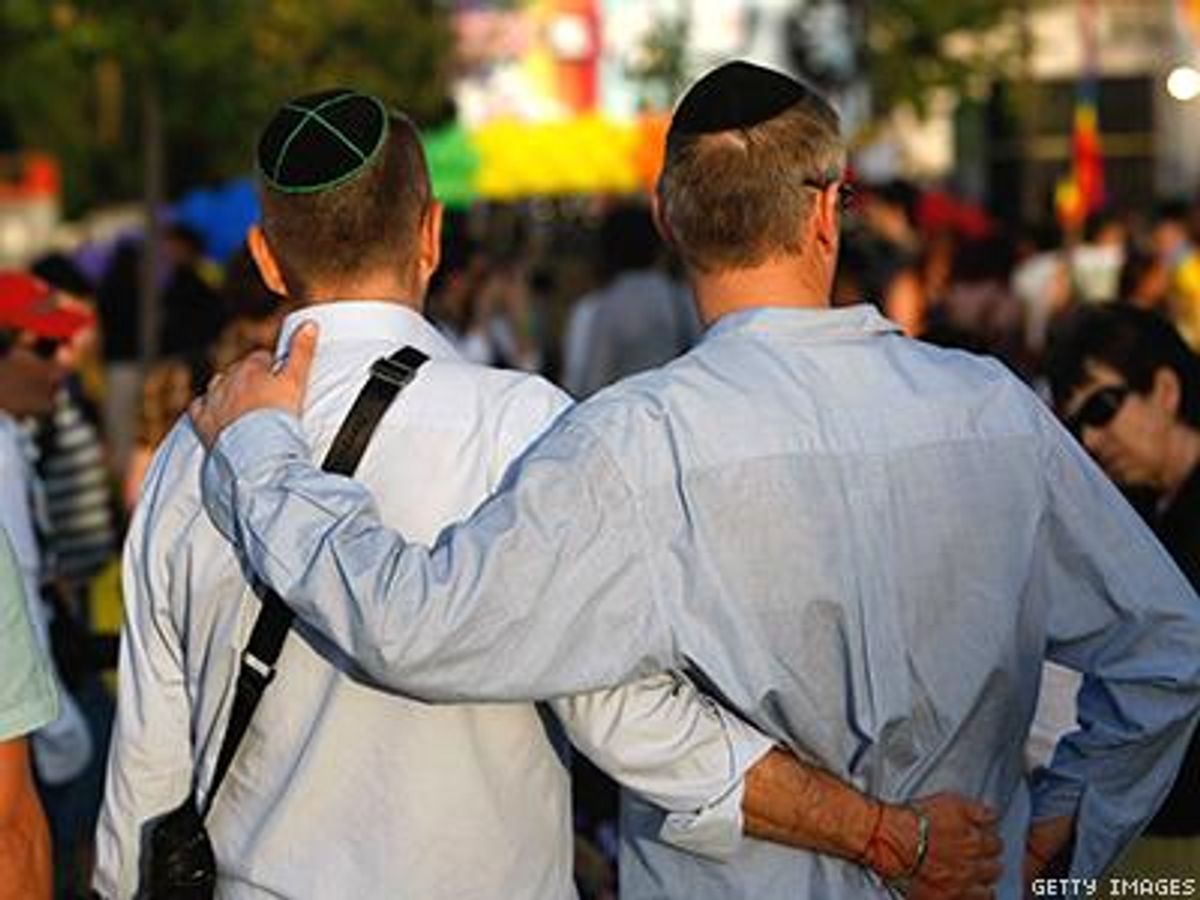In the early 1980s I found it remarkably easy to come out. I was lucky. Police weren't raiding the local gay bar. My appearance didn't trigger anger toward lesbians (nobody imagined I could be bisexual back then). I got heckled when I held my girlfriend's hand, but I consciously chose to defy the heteropatriarchy, so I got what I bargained for.
I also proudly identified as a social, political, and cultural Jew, but I wasn't raised in a religious home.
Today I am a rabbi. So you might wonder why I consider myself fortunate to have been raised by secular parents.
For one thing, I didn't read the Levitical "clobber texts" every year, where the Torah says that a man lying with a man as with a woman is an "abomination." Neither did I read the Deuteronomic text forbidding men and women from wearing one another's clothing, a text used to forbid cross-dressing and transgenderism. My parents didn't teach me that homosexuality and cross-dressing were horrible and punishable by death. I simply did not know that this was part of Jewish belief.
I didn't know that LGBTQI people couldn't become rabbis or cantors or marry their same-gender partner in a religious ceremony. I didn't grow up with the threat of exile, or of parents sitting shiva for me (as if I had died), if I were to come out. Nobody told me that if I partnered with a woman I couldn't experience the satisfaction of a heterosexual relationship, explaining that Adam left his parents to cleave to his wife (not his husband), so only the replication of the Biblical rejoining of man with woman that allows two halves of a soul to become whole.
I was raised with other traditional Jewish values, though. I was taught that my body is wonderful; that sex within marriage should be great; that women are powerful and can be in charge of our own lives. I was raised to fix this broken world and to honor, support, defend, and represent those least resourced. I was raised to challenge oppression and pursue justice.
Yes, I was lucky. No religious texts or biases limited my potential, squelched my organic inclinations, shamed me into self-hatred, or drove me to self-medicate. Many were not as fortunate.
Though most U.S. Jews have historically been politically and religiously progressive, those raised in the 1960s, '70s and '80s weren't hearing LGBTQI-positive sermons. Our difficult scripture filled in the blanks. And of course in most Orthodox settings we still see a range of fear, discomfort, and at times shaming, and even attempts at "reparative" therapy.
Now the vast majority of Reform, Reconstructionist, and Renewal congregations are LGBTQI-welcoming. So are many Conservative communities. There are 200 LGBTQ Jewish clergy and clergy students and an ecumenical faith movement that won't settle for mere welcome, polite acceptance, and basic equality.
Together we work to excite the fullest creativity, foster the greatest empowerment, and provide the most expansive celebration for all peoples.
Over the years I have discovered the greatest untold story for queer people of faith: LGBTQ clergy are in the forefront of healing religious wounds around sexuality.
As theologians we offer nuanced, sophisticated, tradition-drenched interpretations using thousands-year-old methodologies so the Bible no longer clobbers anyone. Here's an example using that Levitical text I mentioned earlier.
Using concordance research we see how the word translated as "abomination" (toevah) shows up elsewhere in scripture. We find that it more accurately means "ritual practice of another tradition that is prohibited to us." (Thanks, Rabbi Jay Michaelson!) Using another standard analysis tool we connect this sentence to the one before it. That one prohibits 'handing over any of our children to the worship of Molech, which would defile the name of G-d." Combine them and we read: Don't worship another G-d, certainly not by engaging in the prohibited ritual practice of another tradition. Ah! So two men cannot have sex in another religion's ritual as a way to worship another G-d -- a very narrow prohibition indeed.
As teachers we also help seekers find themselves in holy texts and rules for right living. Did you know that over 1,500 years ago our rabbinic sages discussed six different gender identities in the Talmud, descriptively, without a hint of judgment or negativity?
As pastoral caregivers we co-create heart-opening rituals for same-gender couples, multiple-parent families, transgender transitioning, and personal awakening, delighting in the courageous lives we are honored to support.
As role models who are out, proud, healthy, loving and religious we attest to a meaningful, queer, spirit-led life. Sometimes just being ourselves opens gateways to those who have felt exiled. I am surprised time and again that simply by my leading prayer as an out bisexual woman, people praying with me have decided that they have come home.
From Sunday through Wednesday, almost 65 Jewish clergy are gathering in San Francisco for Nehirim's LGBTQ clergy conference. We'll be exploring our roles in helping Judaism awaken to the beauty of our diverse lives. But this task isn't ours alone. Every person of faith can access empowering theological interpretations and queer rituals. Every soul that breathes can open their heart to the quintessentially unique teaching that someone else was born to offer, thereby listening another into wholeness.
Blessings to those who left religion and found their soul's needs met in other ways! But for those who have been wounded and still yearn to return to a nourishing spiritual life, may you experience a beautiful homecoming that powerfully connects you to spirit, to yourself, and to your destiny.

RABBI DEBRA KOLODNY is the executive director of Nehirim, an organization whose mission is to cultivate and empower LGBTQ Jewish souls through vibrant, pluralistic, egalitarian, and accessible programming.



















































































Fans thirsting over Chris Colfer's sexy new muscles for Coachella